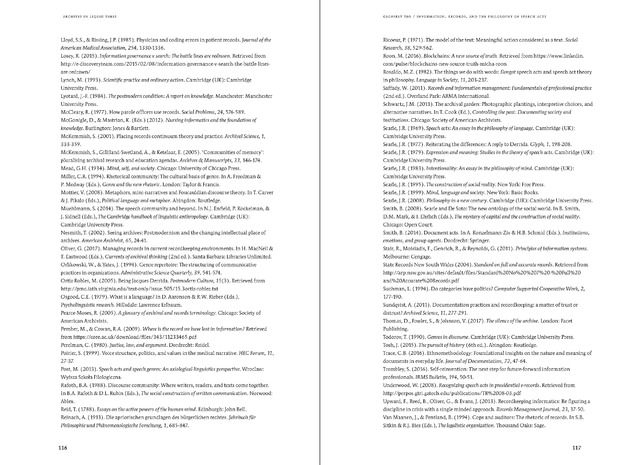archives in liquid times
Lloyd, S.S., Rissing, J.P. (1985). Physician and coding errors in patient records. Journal of the
American Medical Association, 254, 1330-1336.
Losey, R. (2015). Information governance v search: The battle lines are redrawn. Retrieved from
http://e-discoveryteam.com/2015/02/08/information-governance-v-search-the-battle-lines-
are-redrawn/
Lynch, M. (1993). Scientific practice and ordinary action. Cambridge (UK): Cambridge
University Press.
Lyotard, J.-F. (1984). The postmodern condition: A report on knowledge. Manchester: Manchester
University Press.
McCleary, R. (1977). How parole officers use records. Social Problems, 24, 576-589.
McGonigle, D., Mastrian, K. (Eds.) (2012). Nursing informatics and the foundation of
knowledge. Burlington: Jones Bartlett.
McKemmish, S. (2001). Placing records continuum theory and practice. Archival Science, 1,
333-359.
McKemmish, S., Gilliland-Swetland, A., Ketelaar, E. (2005). 'Communities of memory':
pluralising archival research and education agendas. Archives Manuscripts, 33, 146-174.
Mead, G.H. (1934). Mind, self, and society. Chicago: University of Chicago Press.
Miller, C.R. (1994). Rhetorical community: The cultural basis of genre. In A. Freedman
P. Medway (Eds.), Genre and the new rhetoric. London: Taylor Francis.
Mottier, V. (2008). Metaphors, mini-narratives and Foucauldian discourse theory. In T. Carver
J. Pikalo (Eds.), Political language and metaphor. Abingdon: Routledge.
Muehlmann, S. (2014). The speech community and beyond. In N.J. Enfield, P. Kockelman,
J. Sidnell (Eds.), The Cambridge handbook of linguistic anthropology. Cambridge (UK):
Cambridge University Press.
Nesmith, T. (2002). Seeing archives: Postmodernism and the changing intellectual place of
archives. American Archivist, 65, 24-41.
Oliver, G. (2017). Managing records in current recordkeeping environments. In H. MacNeil
T. Eastwood (Eds.), Currents of archival thinking (2nd ed.). Santa Barbara: Libraries Unlimited.
Orlikowski, W., Yates, J. (1994). Genre repertoire: The structuring of communicative
practices in organizations. Administrative Science Quarterly, 39, 541-574.
Ortiz-Robles, M. (2005). Being Jacques Derrida. Postmodern Culture, 15(3). Retrieved from
http://pmc.iath.virginia.edu/text-only/issue.505/15.3ortiz-roblez.txt
Osgood, C.E. (1979). What is a language? In D. Aaronson R.W. Rieber (Eds.),
Psycholinguistic research. Hillsdale: Lawrence Erlbaum.
Pearce-Moses, R. (2005). A glossary of archival and records terminology. Chicago: Society of
American Archivists.
Pember, M., Cowan, R.A. (2009). Where is the record we have lost in informationRetrieved
from https://core.ac.uk/download/files/343/11233465.pdf
Perelman, C. (1980). Justice, law, and argument. Dordrecht: Reidel.
Poirier, S. (1999). Voice structure, politics, and values in the medical narrative. HEC Forum, 11,
27-37.
Post, M. (2013). Speech acts and speech genres: An axiological linguistics perspective. Wroclaw:
Wyzsza Szkola Filologiczna.
Rafoth, B.A. (1988). Discourse community: Where writers, readers, and texts come together.
In B.A. Rafoth D.L. Rubin (Eds.), The social construction of written communication. Norwood:
Ablex.
Reid, T. (1788). Essays on the active powers of the human mind. Edinburgh: John Bell.
Reinach, A. (1913). Die apriorischen grundlagen des bürgerlichen rechtes. Jahrbuch für
Philosophie und Phanomenologische Forschung, 1, 685-847.
116
geoffrey yeo information, records, and the philosophy of speech acts
Ricoeur, P. (1971). The model of the text: Meaningful action considered as a text. Social
Research, 38, 529-562.
Roon, M. (2016). Blockchains: A new source of truth. Retrieved from https://www.linkedin.
com/pulse/blockchains-new-source-truth-micha-roon
Rosaldo, M.Z. (1982). The things we do with words: Ilongot speech acts and speech act theory
in philosophy. Language in Society, 11, 203-237.
Saffady, W. (2011). Records and information management: Fundamentals of professional practice
(2nd ed.). Overland Park: ARMA International.
Schwartz, J.M. (2011). The archival garden: Photographic plantings, interpretive choices, and
alternative narratives. In T. Cook (Ed.), Controlling the past: Documenting society and
institutions. Chicago: Society of American Archivists.
Searle, J.R. (1969). Speech acts: An essay in the philosophy of language. Cambridge (UK):
Cambridge University Press.
Searle, J.R. (1977). Reiterating the differences: A reply to Derrida. Glyph, 1, 198-208.
Searle, J.R. (1979). Expression and meaning: Studies in the theory of speech acts. Cambridge (UK):
Cambridge University Press.
Searle, J.R. (1983). Intentionality: An essay in the philosophy of mind. Cambridge (UK):
Cambridge University Press.
Searle, J.R. (1995). The construction of social reality. New York: Free Press.
Searle, J.R. (1999). Mind, language and society. New York: Basic Books.
Searle, J.R. (2008). Philosophy in a new century. Cambridge (UK): Cambridge University Press.
Smith, B. (2008). Searle and De Soto: The new ontology of the social world. In B. Smith,
D.M. Mark, I. Ehrlich (Eds.), The mystery of capital and the construction of social reality.
Chicago: Open Court.
Smith, B. (2014). Document acts. In A. Konzelmann-Ziv H.B. Schmid (Eds.), Institutions,
emotions, and group agents. Dordrecht: Springer.
Stair, R., Moisiadis, F., Genrich, R., Reynolds, G. (2011). Principles of information systems.
Melbourne: Cengage.
State Records New South Wales (2004). Standard on full and accurate records. Retrieved from
http://arp.nsw.gov.au/sites/default/files/Standard%20No%20%207%20-%20Full%20
and%20Accurate%20Records.pdf
Suchman, L. (1994). Do categories have politics? Computer Supported Cooperative Work, 2,
177-190.
Sundqvist, A. (2011). Documentation practices and recordkeeping: a matter of trust or
distrust? Archival Science, 11, 277-291.
Thomas, D., Fowler, S., Johnson, V. (2017). The silence of the archive. London: Facet
Publishing.
Todorov, T. (1990). Genres in discourse. Cambridge (UK): Cambridge University Press.
Tosh, J. (2015). The pursuit of history (6th ed.). Abingdon: Routledge.
Trace, C.B. (2016). Ethnomethodology: Foundational insights on the nature and meaning of
documents in everyday life. Journal of Documentation, 72, 47-64.
Trombley, S. (2016). Self-reinvention: The next step for future-forward information
professionals. IRMS Bulletin, 194, 50-51.
Underwood, W. (2008). Recognizing speech acts in presidential e-records. Retrieved from
http://perpos.gtri.gatech.edu/publications/TR%2008-03.pdf
Upward, F., Reed, B., Oliver, G., Evans, J. (2013). Recordkeeping informatics: Re figuring a
discipline in crisis with a single minded approach. Records Management Journal, 23, 37-50.
Van Maanen, J., Pentland, B. (1994). Cops and auditors: The rhetoric of records. In S.B.
Sitkin R.J. Bies (Eds.), The legalistic organization. Thousand Oaks: Sage.
117

